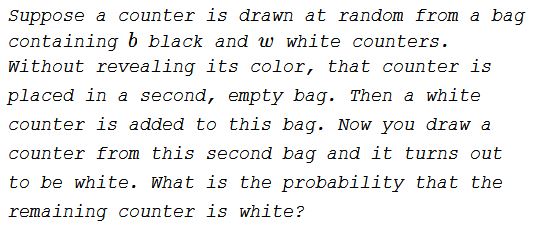A Followup on Lewis Carroll's Pillow Problem
Problem

Solution 1 (Correct, short)
Prior odds in favor of two white counters in the second bag is $w:b,$ but drawing $w$ is twice as likely under $ww,$ then under $bw$ so posterior odds in favor are $2w:b,$ i.e. $\displaystyle Prob(ww|\text{drawn }w)= \frac{2w}{2w+b}.$
Solution 2 (Correct, long)
We'll use Bayesian Odds.
Introduce $\displaystyle P(W)=\frac{w}{w+b},$ probability of the counter removed from the first bag being white for the black counter it is $\displaystyle P(W)=\frac{b}{w+b};$ $P(W|W)$ and $P(B|W)$ are the probabilities that the remaining counter in the second bag is white and black, respectively; $\overline{P}(W|W)$ and $P(W|B)$ are the probabilities of removing of a white counter from the second bag, provided that it contains two white or a black and a white counters.
The Bayesian odds are expressed as $\displaystyle \frac{P(W|W)}{P(B|W)}=\frac{\overline{P}(W|W)}{P(W|B)}\cdot\frac{P(W)}{P(B)}.$ It is obvious that $\displaystyle\frac{\overline{P}(W|W)}{P(W|B)}=2,$ implying
$\displaystyle \frac{P(W|W)}{P(B|W)}=2\cdot\frac{w}{b}=\frac{2w}{b}.$
Since $P(W|W)+P(B|W)=1,$ we derive $\displaystyle P(W|W)=\frac{2w}{2w+b}.$
Solution 3 (Correct, long)
We'll use Bayes' Theorem. The notations are from the previous solution:
$\displaystyle\begin{align}P(W|W)&=\frac{\overline{P}(W|W)\cdot P(W)}{\overline{P}(W|W)\cdot P(W)+P(W|B)\cdot P(B)}\\ &=\frac{\displaystyle 1\cdot \frac{w}{w+b}}{\displaystyle 1\cdot \frac{w}{w+b}+\frac{1}{2}\cdot \frac{b}{w+b}}\\ &=\frac{\displaystyle \frac{w}{w+b}}{\displaystyle \frac{1}{2}\cdot\frac{2w+b}{w+b}}=\frac{2w}{2w+b}. \end{align}$
Solution 4 (Incorrect)
There's a $50%$ chance that the remaining ball is from the original bag, and so $\displaystyle P = \frac{w}{w+b}$ and another $50%$ chance that the remaining ball is the added "white one", which has $P =1.$ So the probability is $\displaystyle 0.5\frac{w}{w+b} + 0.5$ which simplifies to $\displaystyle P = \frac{2w+b}{2(w+b)}.$
What's wrong?
Assume that there where no white counters in the first bag: $w=0.$ Then the probability of the leftover counter being white is zero. However, for $w=0,$ the formula produces $\displaystyle \frac{1}{2}.$
Acknowledgment
The problem is a generalization of Lewis Carroll's Pillow problem suggested by Chris Conradi. Solution 1 is by Joshua B. Miller.
|Contact| |Front page| |Contents| |Up|
Copyright © 1996-2018 Alexander Bogomolny71544381
